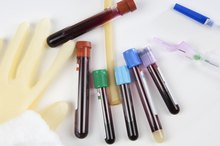What does fact checked mean?
At Healthfully, we strive to deliver objective content that is accurate and up-to-date. Our team periodically reviews articles in order to ensure content quality. The sources cited below consist of evidence from peer-reviewed journals, prominent medical organizations, academic associations, and government data.
- Linus Pauling Institute; Potassium; Jane Higdon, Ph.D.; February 2004
- "American Journal of Physiology"; Potassium's Cardiovascular Protective Mechanisms; D. Young, et al.; April 1995
- "American Journal of Physiology"; Potassium's Cardiovascular Protective Mechanisms; D. Young, et al.; April 1995
- "Hypertension"; Potassium Chloride Supplementation Diminishes Platelet Reactivity in Humans; M. Kimura, et al.; December 2004
- "Hypertension"; Potassium Chloride Supplementation Diminishes Platelet Reactivity in Humans; M. Kimura, et al.; December 2004
- Linus Pauling Institute; Vitamin K; Jane Higdon, Ph.D.; May 2004
The information contained on this site is for informational purposes only, and should not be used as a substitute for the advice of a professional health care provider. Please check with the appropriate physician regarding health questions and concerns. Although we strive to deliver accurate and up-to-date information, no guarantee to that effect is made.
Does Potassium Thicken Your Blood?
Potassium, designated by the letter K on the periodic table because its Latin name is kalium, does not thicken your blood. Vitamin K, a vitamin, not a mineral, and a completely different substance from potassium, increases your blood's ability to clot. This action does not "thicken" your blood in any way; it just increases the number of clotting factors, which help produce thrombin. Thrombin helps blood clots form. High potassium intake may also decrease rather than increase your blood's ability to clot, reducing the risk of heart disease.
Actions
Your body maintains serum potassium levels within a narrow range. Potassium helps skeletal and smooth muscles contract; both lower and higher than normal levels of potassium can produce heart arrhythmia, weakness and complications that can lead to death. Potassium in the high but still normal range may also have heart-protective benefits on the blood vessels.
Studies
Does Potassium Aid in Weight Loss?
Learn More
A study conducted by researchers from the University of Mississippi Medical Center and reported in the April 1995 "American Journal of Physiology" found that increased potassium levels inhibited platelet aggregation, the ability of platelets to clump together, and arterial thrombosis, clot formation within the arteries 2. A University of Medicine and Dentistry of New Jersey study reported in the December 2004 issue of "Hypertension" determined that potassium chloride supplementation decreased platelet reactivity 3.
Effects
Inhibiting platelet aggregation doesn't make the blood thinner. The blood still contains the same number of blood cells, including platelets. But when platelets stick together, they release vasoconstrictors that narrow blood vessels as well as thomboxane A2, which increases platelet aggregation and vasoconstriction. Inhibiting platelet aggregation decreases clot formation that can block blood flow through blood vessels.
- Inhibiting platelet aggregation doesn't make the blood thinner.
Considerations
Can Low Potassium Cause Death?
Learn More
It's easy to confuse potassium with vitamin K, a substance that increases the blood's ability to clot. Potassium may have the opposite effect, reducing the blood's ability to clot. Do not take potassium supplements or greatly increase your potassium intake without your doctor's approval, especially if you have high potassium levels or kidney disease, which can increase your potassium levels.
Related Articles
References
- Linus Pauling Institute; Potassium; Jane Higdon, Ph.D.; February 2004
- "American Journal of Physiology"; Potassium's Cardiovascular Protective Mechanisms; D. Young, et al.; April 1995
- "Hypertension"; Potassium Chloride Supplementation Diminishes Platelet Reactivity in Humans; M. Kimura, et al.; December 2004
- Linus Pauling Institute; Vitamin K; Jane Higdon, Ph.D.; May 2004
- Dylewski JF, Linas S. Variability of potassium blood testing: Imprecise nature of blood testing or normal physiologic changes? Mayo Clinic Proceedings. 2018. 93(5):551-554. doi:10.1016/j.mayocp.2018.03.019
- Friedman PA, Scott CG, Bailey K, et al. Errors of classification with potassium blood testing: The variability and repeatability of critical clinical tests. Mayo Clinic Proceedings. 2018;93(5):566-572. doi:10.1016/j.mayocp.2018.03.013
- Galloway CD, Valys AV, Shreibati JB, et al. Development and validation of a deep-learning model to screen for hyperkalemia from the electrocardiogram. JAMA Cardiology. 2019. 4(5):428-436. doi: 10.1001/jamacardio.2019.0640
- National Heart, Lung, and Blood Institute. Blood tests.
- Ialongo C, Bernardini S. Phlebotomy, a bridge between laboratory and patient. Biochem Med (Zagreb). 2016;26(1):17–33. doi:10.11613/BM.2016.002
- Schmidt ST, Ditting T, Deutsch B, et al. Circadian rhythm and day to day variability of serum potassium concentration: A pilot study. Journal of Nephrology. 2015. 28(2):165-72. doi:10.1007/s40620-014-0115-7
- Chatterjee R, Yeh HC, Shafi T, et al. Serum potassium and the racial disparity in diabetes risk: the Atherosclerosis Risk in Communities (ARIC) Study. American Journal of Clinical Nutrition. 2011. 93(5):1087-91. doi:10.3945/ajcn.110.007286
- Cleveland Clinic. Hyperkalemia (high blood potassium). Updated October 19, 2016.
- Cleveland Clinic. Low potassium levels in your blood (hypokalemia). Updated March 12, 2018.
- Kardalas E, Paschou SA, Anagostis P, et al. Hypokalemia: a clinical update. Endocrine Connections. 2018;7(4):R135-R146. doi:10.1530/EC-18-0109
- Cleveland Clinic. Low potassium levels in your blood (hypokalemia): Management and treatment. Updated March 12, 2018.
- Bnaya A, Ruchlemer R, Itzkowitz E, Gabbay E, Shavit L. Pseudohyperkalemia in chronic lymphocytic leukemia. American Journal of Medicine. 2020;133(2):e52-e53. doi:10.1016/j.amjmed.2019.07.037
- Ben Salem C, Badreddine A, Fathallah N, Slim R, Hmouda H. Drug-induced hyperkalemia. Drug Safety. 2014. 37(9):677-92. doi:10.1007/s40264-014-0196-1
- Cleveland Clinic. How can hyperkalemia (high blood potassium levels) be treated? Updated October 19, 2016.
- Miller KC. Plasma potassium concentration and content changes after banana ingestion in exercised men. J Athl Train. 2012;47(6):648–654. doi:10.4085/1062-6050-47.6.05
- American Association for Clinical Chemistry. Potassium. Updated 12/13/19.
- Jameson JL, et. al. Harrison's Principles of Internal Medicine, 20th Edition. McGraw Hill Education. 2018.
- Kovesdy CP, Appel LJ, Grams ME, et al. Potassium homeostasis in health and disease: A scientific workshop cosponsored by the National Kidney Foundation and the American Society of Hypertension. Journal of the American Society of Hypertension. 2017;11(12):783-800. doi:10.1016/j.jash.2017.09.011
- Nilsson E, Gasparini A, Arnlov J, et al. Incidence and determinants of hyperkalemia and hypokalemia in a large healthcare system. International Journal of Cardiology. 2017;15;245:277-284. doi:10.1016/j.ijcard.2017.07.035
- Pagana KD, Pagana TJ, Pagana TN. Mosby’s Diagnostic & Laboratory Test Reference. 14th ed. St. Louis, Mo: Elsevier; 2019.
- Schrier RW. Renal and Electrolyte Disorders, 8th Edition. LWW. 2017.
- Shrimanker I, Bhattarai S. Electrolytes. in: StatPearls. Updated January 20, 2020.
Writer Bio
A registered nurse with more than 25 years of experience in oncology, labor/delivery, neonatal intensive care, infertility and ophthalmology, Sharon Perkins has also coauthored and edited numerous health books for the Wiley "Dummies" series. Perkins also has extensive experience working in home health with medically fragile pediatric patients.









